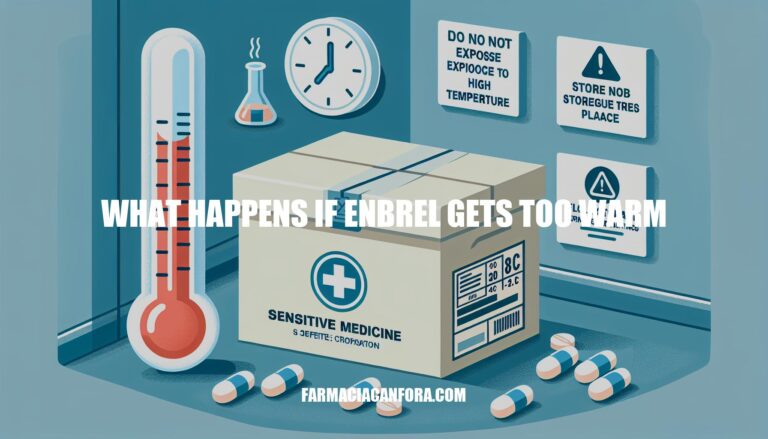Enbrel (etanercept) is a medication used to treat inflammatory conditions like rheumatoid arthritis and psoriasis. Proper storage is crucial to maintain its effectiveness. If Enbrel gets too warm, it can denature the active ingredients, reducing its potency and potentially leading to contamination. Always store Enbrel in the refrigerator at 2°C to 8°C (36°F to 46°F) and avoid exposing it to heat or direct sunlight.
Storage Guidelines
Recommended Storage Conditions for Enbrel:
- Refrigeration: Store Enbrel in the refrigerator at 36°F to 46°F (2°C to 8°C) .
- Room Temperature: If needed, it can be stored at room temperature (68°F to 77°F or 20°C to 25°C) for up to 30 days. After this period, it should be discarded .
- Avoid Extreme Temperatures: Do not freeze Enbrel or expose it to extreme heat .
Consequences of Enbrel Getting Too Warm:
- Decreased Potency: Exposure to temperatures above 77°F (25°C) can lead to the denaturation of the active ingredients, reducing the drug’s effectiveness .
- Microbial Growth: Higher temperatures can promote the growth of microbes, potentially contaminating the medication .
- Destruction of Medicine: Attempting to warm Enbrel using a microwave or hot water can destroy the medicine .
If Enbrel is exposed to temperatures outside the recommended range, it may not work as intended, posing risks to your health. Always follow storage guidelines to ensure its efficacy and safety.
Chemical Stability
Enbrel (etanercept) is a biologic medication used to treat autoimmune diseases. Chemically, it is a dimeric fusion protein that is generally stable under recommended storage conditions.
Chemical Stability:
- Enbrel is stable when stored in a refrigerator at 2°C to 8°C (36°F to 46°F).
- It should not be frozen or exposed to direct sunlight.
Effects of Heat:
- If Enbrel gets too warm, its protein structure can denature, leading to reduced efficacy.
- Heat can cause the protein to aggregate or degrade, which may result in a loss of biological activity.
- Using Enbrel that has been exposed to high temperatures can potentially lead to ineffective treatment and increased risk of adverse reactions.
It’s crucial to follow storage guidelines to maintain the medication’s effectiveness. If you suspect Enbrel has been exposed to improper temperatures, it’s best to consult a healthcare provider before using it.
Microbial Contamination
Microbial Contamination Risks:
- Infections: Enbrel (etanercept) can lower the immune system’s ability to fight infections, increasing the risk of serious infections like tuberculosis (TB), bacterial sepsis, and invasive fungal infections.
- Health Hazards: These infections can lead to hospitalization or even death. Patients with diabetes or immune system problems are at higher risk.
Effects of Enbrel Getting Too Warm:
- Denaturation: Exposure to temperatures above 77°F (25°C) can denature the active ingredients, reducing the drug’s effectiveness.
- Microbial Growth: Warm temperatures can promote microbial growth, contaminating the drug and posing serious health risks.
- Decreased Potency: The drug’s potency decreases, making it less effective in treating conditions like rheumatoid arthritis and psoriasis.
Patient Safety
Patient Safety Concerns:
- Infections: Enbrel can lower your immune system’s ability to fight infections, including serious ones like tuberculosis (TB), fungal, bacterial, and viral infections.
- Cancer Risk: There’s a slightly increased risk of lymphoma and other cancers.
- Other Conditions: Patients with diabetes, HIV, or a weak immune system should be cautious.
If Enbrel Gets Too Warm:
- Temperature Limits: Enbrel should be kept refrigerated between 2°C to 8°C (36°F to 46°F). It can be kept at room temperature (up to 25°C or 77°F) for up to 14 days.
- Consequences of Overheating: Exposure to temperatures above 25°C (77°F) can denature the active ingredients, reduce the drug’s potency, and potentially lead to contamination.
Advice:
- Do Not Use: If Enbrel has been exposed to temperatures above 25°C (77°F), do not use it.
- Contact Healthcare Provider: Consult your healthcare provider for guidance on what to do next.
Important Storage Guidelines for Enbrel
If Enbrel (etanercept) gets too warm, it can denature its active ingredients, reducing its potency and potentially leading to contamination. This can cause decreased efficacy in treating conditions like rheumatoid arthritis and psoriasis, as well as increase the risk of serious infections and other health hazards.
Exposure to temperatures above 77°F (25°C) can also promote microbial growth, contaminating the drug. It is crucial to follow storage guidelines, storing Enbrel in a refrigerator at 2°C to 8°C (36°F to 46°F), and avoiding extreme temperatures or direct sunlight.
If Enbrel has been exposed to improper temperatures, it’s best to consult a healthcare provider before using it.


